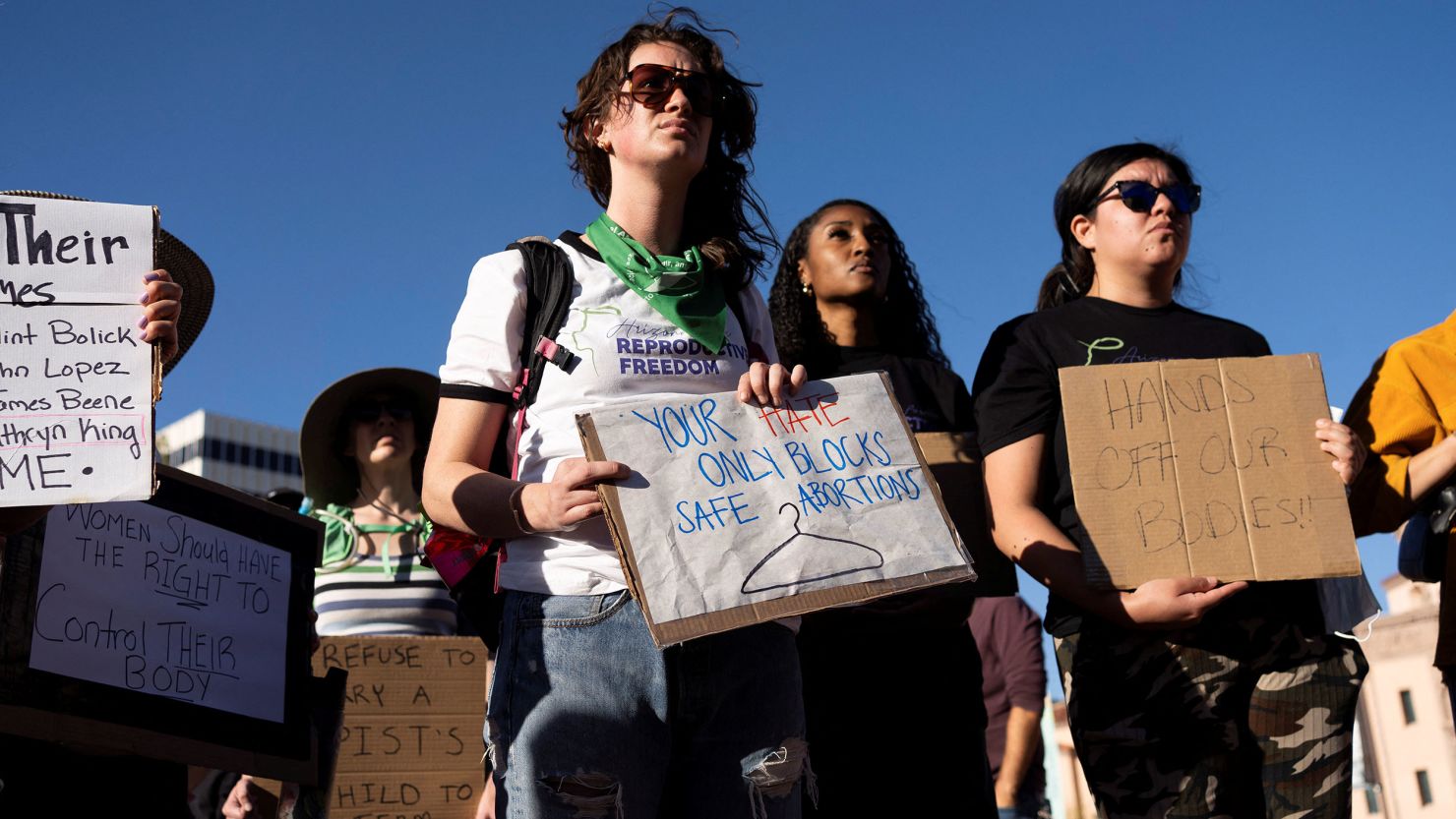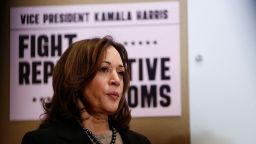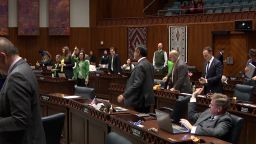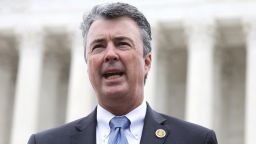Arizona officials are scrambling to address a near total abortion ban revived by the state’s Supreme Court this week, before the Civil War-era law almost completely halts access to Arizona’s already limited abortion services.
The court ruled Tuesday the state must?adhere to a law made before statehood, when Arizona was a territory,?that bans all abortions except those “necessary to save” a pregnant person’s life.?The law,?which is enforceable because Roe v. Wade was overturned,?is broader than the?state’s 2022 ban on abortions after 15 weeks of pregnancy and carries a prison sentence of two to five years for abortion providers.
Vice President Kamala Harris travels Friday to Arizona as mounting political pressure this election year has brought abortion to the forefront as a likely ballot issue, analysts say. Arizona Republicans two days earlier thwarted a vote to repeal the?1864?ban as the scene on the state House floor erupted into chaos and Democrats chanted “shame.”
The?state Supreme Court delayed enforcement of the law for 14 days to give the plaintiffs an opportunity to pursue other challenges in a lower court if they wish to –?including challenges to the ban’s constitutionality.
It’s unlikely there will be much movement on?enforcing the law?as legal challenges are likely to get tied up in the lower courts for some time, legal experts say.
While Arizona Attorney General Kris Mayes and several county attorneys say they will not prosecute abortion cases under the new ban, analysts say it’s unlikely providers will take on the liability of performing illegal medical services, leading to a possible chilling effect on abortions statewide.
In the meantime, abortion rights advocates are encouraging Arizona patients to seek services while they are still available and to get to the polls in November?when they will have the opportunity to vote on a ballot measure that would restore abortion access through the point of viability –?approximately 24 weeks?into pregnancy.
Here’s what could come next legally:
Will abortion cases be prosecuted?
Arizona Democratic Gov. Katie Hobbs slammed the state Supreme Court decision Tuesday, vowing to fight for reproductive freedom for the people of Arizona.
Hobbs signed an?executive order?in June granting the state attorney general authority over prosecuting abortion-related cases in the state, though that order has yet to be tested.
“It?just prevents an extreme county attorney from using this ban to criminalize women and doctors for seeking the care or providing the care that their patients need,” Hobbs told CNN on Tuesday.
“It hasn’t been tested yet, and I am hopeful that it doesn’t have to be.”
The attorney general’s office has not prosecuted providers or patients under the existing 15-week abortion ban and does not intend to prosecute any cases under the near-total ban, Mayes told CNN on Tuesday.
“We’re looking at everything that we possibly can to make sure that this ban never actually goes into place in Arizona,” Mayes said, noting there will be opportunities in the next couple of months to fight the ban in court.
Mayes acknowledged it is possible supporters of the abortion ban will try to take her to court over enforcement of the law.
“I’ll see them in court,” she said.
Maricopa County Attorney Rachel Mitchell?told CNN her office has yet to receive a request to prosecute an abortion case in the nearly two years since Roe v. Wade was overturned and does not anticipate that will change.
“It is important to remember that under Arizona’s law, women who get an abortion cannot be prosecuted. (The state Supreme Court) ruling does not change that: women cannot and will not be prosecuted for receiving an abortion,” the statement said.?Arizona’s 1864 law does not outline punishment for pregnant people, only providers, and the 2022 law states women may not be prosecuted for attempting or undergoing an abortion.
Though the state Supreme Court’s decision would have a chilling effect on abortion services, it will not end the need for those services and will ultimately lead to an increase of unsafe abortions and threaten the liberties of those involved, the Pima County Attorney’s Office warned in a statement.
“I will not be using precious resources to prosecute credited health providers,” Pima County Attorney Laura Conover told CNN in an email.
The Pinal County Attorney’s Office said it will evaluate each case.
“We will review the Court’s ruling and as always, assess every case on its individual?merits. It’s important to note that even pertaining to the 15-week law, we have not received a single submittal from any agency to review,” Mike Pelton, a public information officer for the county attorney’s told CNN in a statement.
“There’s an enormous amount of prosecutorial discretion under Arizona law,” Professor Paul Bender, dean emeritus of Arizona State University Law School, told CNN on Wednesday.
Bender said it’s unlikely officials will attempt to prosecute abortion cases while the future of the law remains so uncertain, although others note that proponents of the ban could use political pressure to push for its enforcement.
Anti-abortion groups could try to pressure prosecutors to enforce the law and use their political power to remove people from office who do not enforce it, Susie Salmon, a clinical law professor at the University of Arizona, told CNN. Or they could try to bring litigation in a lower court, Salmon said.
Providers in limbo
Even if the ban is?implemented, it’s unclear how small a window is left open by the exception allowing abortions to save a pregnant person’s life. That’s a medical distinction, not a legal one, Salmon said. She supervised a group of students who filed an amicus brief in the state Supreme Court case.
“It puts doctors in an untenable position of having courts potentially second guess their considered, educated medical decisions about what’s necessary to save their patient’s life,” said Salmon, who is also the director of legal writing at the university.
“It also puts doctors in the untenable position of having to withhold treatment where treatment is necessary, for example, to preserve a woman’s fertility, to preserve a woman’s health, to prevent a woman from being potentially permanently disabled,” Salmon added.
In 2022, 11,530 abortions were performed in the state, almost 99% of which were provided to Arizona residents, according to the latest data available from the Arizona Department of Health Services.
“It is really unconscionable that folks in Arizona now are going to have to go to Nevada, California, New Mexico or Colorado to get the care that they need,” Hobbs told CNN on Tuesday.
Dr. Jill Gibson, chief medical director of Planned Parenthood Arizona, said she immediately started receiving questions from patients asking if they would be able to get the care they needed when the decision came out Tuesday.
“This is going to have absolutely unbelievable consequences for the patients in our community and we just … cannot state enough how dire the situation is going to be for the patients who need to access abortion here in Arizona,” she said.
Dr. DeShawn Taylor,?president and CEO?of?Desert Star Institute for Family Planning, warned the law will have a particular impact on marginalized groups.
“We cannot amplify enough who these abortion bans mostly impact,” Taylor said in a statement.
“Historically marginalized and oppressed groups who already face barriers to care. These are low-income families, rural residents, immigrants, disabled, Black, Indigenous, and people of color.?These communities experience physical, medical, emotional and financial harm because of these policies.”
Since the law mentions the use of drugs to induce miscarriage, Salmon said use of the abortion pill is also at risk.
And Hobbs warned Tuesday access to other reproductive health services is also on the line. “We know that IVF is under attack. We know that contraception is under attack,” she said.
Abortion on the ballot this November
While the courts and state officials grapple with the law, Arizona residents will have the opportunity to vote in the matter themselves this November.
Arizona?for Abortion Access, a group of abortion rights organizations, announced last week it had gathered enough signatures for a November 2024?ballot?measure that would ask voters to enshrine abortion rights in the state’s constitution.
The measure would restore abortion access up to the point of viability, which advocates say is more reasonable than the state’s current 15-week ban.
The push is part of a massive effort to get abortion on the 2024?ballot?in several states, a move abortion rights advocates are hopeful will restore some power to voters rather than state courts.
“Everything is going to be caught up in court fighting back and forth over the next several months,” said Bender. “It’ll be just waiting for the people to resolve the situation. And I think they will resolve it in November.”
CNN’s Natasha Chen, Melissa Alonso and Andy Rose contributed to this report.








